
The Different Types of Manufacturing Processes That Exist Today
The manufacturing industry has one of the lowest unemployment rates in the United States. Whether you’re curious or aspiring to be a manufacturer, learning types of manufacturing is a must.
The knowledge ensures you can pick the correct method for your purposes. Otherwise, you’ll end up wasting time and effort due to inefficiency.
Knowing where to start can be difficult. Read on for a quick guide on the types of manufacturing processes.
Repetitive Manufacturing
Manufacturers use this method to commit to a specific production rate. As such, it has dedicated production lines creating the same items. The process never stops, operating 24/7 all year round.
Repetitive manufacturing has minimal setups with little to no changeovers. As a result, its operation speeds are adjustable to meet client demands. Its most distinguishing feature is using assembly or production lines.
Discrete Manufacturing
This product development process also uses an assembly line. However, its primary selling point is its diversity. Discrete manufacturing uses various steps and frequent changeovers, contrasting its repetitive counterpart.
It depends on whether the items produced have similar or varying designs. If it’s the latter, you must alternate the setup. The tear-down means production will take longer.
Manufacturing businesses using discrete manufacturing often produce recyclable products. These include:
- Cars
- Furniture
- Toys
- Smartphones
This capability makes it more sustainable than some other processes. It becomes part of production-related waste management techniques. As a result, hazardous waste collection decreases.
Job Shop Manufacturing
Job shop manufacturing uses production areas instead of assembly lines. It produces smaller custom product batches. This capability makes it best suited for made-to-order (MTO) or made-to-stock (MTS).
Manufacturers can make one or more custom products using job shop workstations. When customer demand increases, it can become a discrete manufacturing line. Automated equipment will replace some labor operations.
Continuous Process Manufacturing
This type of manufacturing is similar to repetitive manufacturing. It runs 24/7, but it differs due to the raw materials involved. It uses gases, slurries, powders, and slurries.
Continuous processes are usable in the chemical, mining, and food industries. Its resulting products are similar unless instructed to make more diverse item variations.
Batch Process Manufacturing
Batch process manufacturing combines discrete and job shop processes. A batch can be enough to meet the demand, depending on your consumers.
After a production run, you can clean the equipment and prepare the machine for the next batch. Regardless, batch processes are continuous.
You can use batch processes when the ingredients or raw materials have looser standards. The product ingredients are the same, but the creation process is more diverse.
Do you need help with your chemical enterprise? If so, consider investing in ERP for chemical manufacturing industry now.
Learn More Manufacturing Processes Now
These are the most common manufacturing processes in the market. We hope you found the best one for your business through this guide. Otherwise, explore other options like rapid prototyping to enrich your company.
Did you find this guide helpful? If so, read our other posts for more.
